Last updated on 2020-03-08
Senator Brock Greenfield (R-2/Clark) has our state-subsidized dual credit program for high school juniors and seniors on his mind. After reviewing the Legislative Research Council’s November 2019 evaluation of our dual credit program, Senator Greenfield proposed three bills to restrict the program; two have passed the Senate.
Dual credit is a popular program, as indicated by both growing participation and state expenditure. Since the Legislature authorized the program in 2014, and the yearly subsidy has more than tripled from $1.18 million to this year’s estimated $4.32 million. In the first four years, the number of high school students dual enrolling at our universities and vo-techs nearly doubled (the LRC review doesn’t have firm current enrollment numbers; it apparently takes longer to count kids than money).
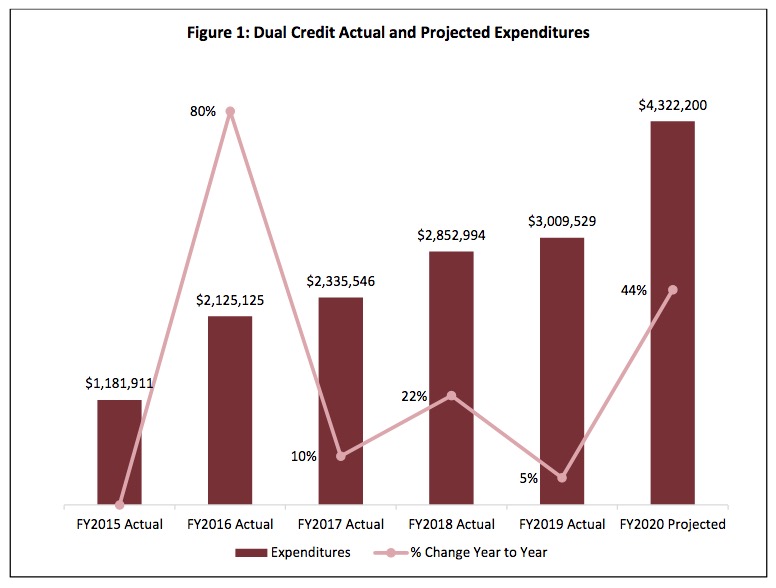
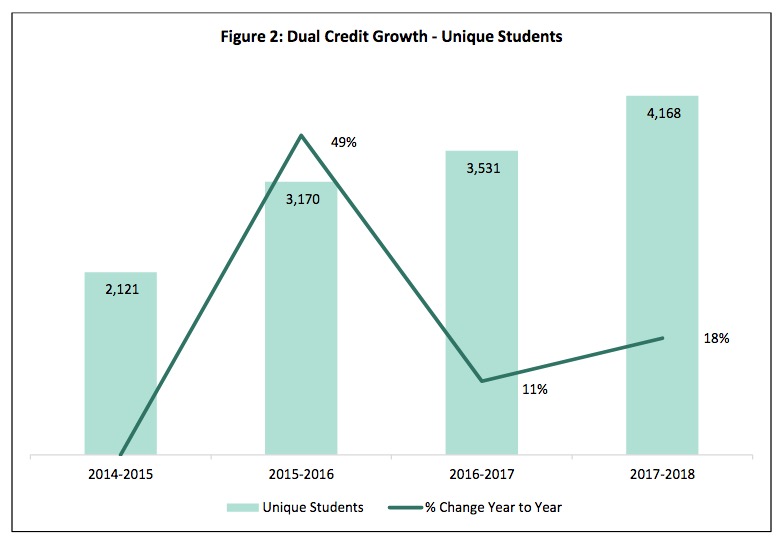
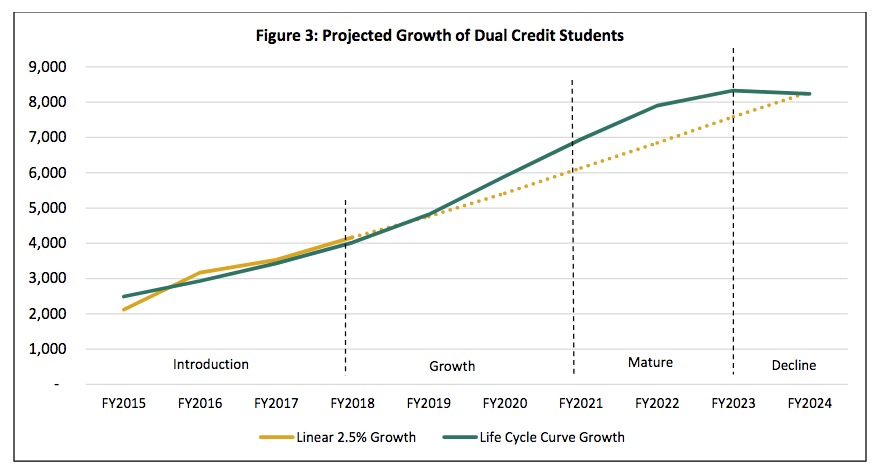
First, Senator Greenfield proposed Senate Bill 142 to restrict the university courses high school students can take for dual credit on the public dime.
Right now, high school students who want to save money by taking college courses that will count toward their high school diplomas and their college transcripts can take pretty much whatever courses the universities will allow. Greenfield’s original proposal would have limited dual-enrollment course options to general education courses. Now at Northern, that’s over a hundred courses covering English, speech, foreign languages, social science, philosophy, math, lab science, and fine arts. Those courses are probably plenty to keep most high school students occupied.
According to the LRC program evaluation (p. 17), the Board of Regents already restrict dual enrollers from taking upper-level courses, though they will approve exceptions. The amount spent on those exceptions in FY 2018 was 1.9% of the total program cost for the state.
Greenfield’s prohibition of those exceptions would have prevented the most ambitious high school dual-enrollers from getting a jump on program-specific courses. For instance, a young math whiz who wants to major in accounting could not dual enroll in the entry-level Principles of Accounting courses. A smart high school junior keen on entering the biotechnology field that the Governor says is one of South Dakota’s growth industries would not be able to take Biotechnology Lab Methods or Cell Culture Techniques, basic courses in Northern’s Biotech associate’s degree program. Bright Central and Roncalli juniors heeding Rep. Michael Saba’s call to help South Dakota boost its exports could take Business Ethics and Business Stats but would not be able to take any of the other business core courses to clear pre-reqs or advance in their senior year to any of the meaty courses specific to international trade.
We already govern education toward mediocrity with our focus on standardized tests and Bill Janklow’s dismantling of gifted education. Dual enrollment is meant to encourage academic strivers; why throttle that opportunity?
Senate Appropriations decided Monday to keep aiming higher. Instead of capping ambitions at the top, the smartest Senate committee decided to place a restriction on the other end, amending SB 142 to prohibit dual credit and state subsidy for remedial courses. The Regents already generally prohibit dual enrollment in remedial courses, with case-by-case exceptions; the vo-techs apparently allow such dual enrollment (LRC review, p. 17). As amended, SB 142 takes the reasonable position that students shouldn’t be setting foot on a college campus, much less getting us to pay their tuition, until they know their high school English and math. That restriction was unpalatable to Appropriator extraordinaire Senator Reynold Nesiba (D-15/Sioux Falls), but the other eight Senate Appropriators said cool, and yesterday the full Senate approved SB 142 on a 31–3 vote.
Senator Greenfield proposed two other bills to wave a stick at high school students who dual enroll and fail to perform well. Senate Bill 143 would charge any student who fails or withdraws late without credit full tuition; Senate Bill 144 would impose no financial penalty but would simply prohibit the student from taking any more dual credit courses.
Just how often do dual-enrolled high school students fail or withdraw late? Let’s look at the numbers:
From FY2015 through FY2018, 10,618 students dual enrolled in 29,491 courses. (66% took university courses; 26% took vo-tech courses; 8% took both university and vo-tech courses.) Those students passed 92.8% of those courses. 2.7% of the enrollments resulted in Fs; 4.1% ended in withdrawal after the final drop date.
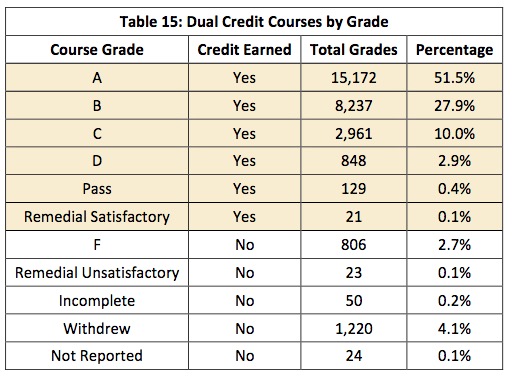
Estimating just by those percentages, SB 143 would have recouped 6.8% of our expenditures on dual credit—$194K in FY 2018, $295K this year.
LRC estimates that SB 144 would save even less. 1,630 students over the first four years failed to earn credit in a dual enrollment course. 73.4% of them didn’t bother to dual enroll again, so SB 144’s one-strike rule wouldn’t have affected them. Of the students who failed once then tried again, 73.0% got credit. So over four years, we had 117 repeat failures/withdrawers, on whose repeat bombings we spent $255,630. (Jeepers—we waste that much subsidizing lazy legislators like Brock’s pal Al Novstrup.)
Everybody from the lobby—Department of Education, the big high schools, Board of Regents, vo-techs, and the Chamber of Commerce—said Nooooo way! Monday to the big financial penalty of SB 143. I’d say no, too. Why penalize high school students for taking a risk and challenging themselves? Facing that heat, Senate Appropriations voted 7–2 to table that bill and focus on SB 144. They added an exception to 144’s one-strike rule, granting the Regents and the vo-techs authority to allow a student who “demonstrates good cause” for poor performance to dual enroll again. Conservatives White, Wiik, and Partridge resisted that softening; Senator Nesiba joined them in voting against SB 144 as a whole. The one-strike rule with appeals squeaked out of committee on a 5–4 vote.
The full Senate yesterday further amended SB 144 to allow high school students who don’t earn credit on one dual-enrolled course to retake the course at their own expense and, if they pass, qualify again for the state subsidy for other courses. Thus amended, SB 144 passed the full Senate 28–6.
Dual enrollment is a good investment in South Dakota’s youth and our higher education system. Students who dual enroll are more likely to attend our state universities (but not our vo-techs?!) than go out of state, and our retention rates for dual enrollment students who then come as regular students are higher at our universities and vo-techs than for non-dual enrollment students. Allowing our most ambitious students to jump beyond our limited high school curricula to challenge themselves is at least partial compensation for our failure to support gifted education and offer robust state scholarship programs.
SB 142 and SB 144 are arguably reasonable accountability measures for dual enrollment, but we shouldn’t go looking to restrict this small but important investment in education.
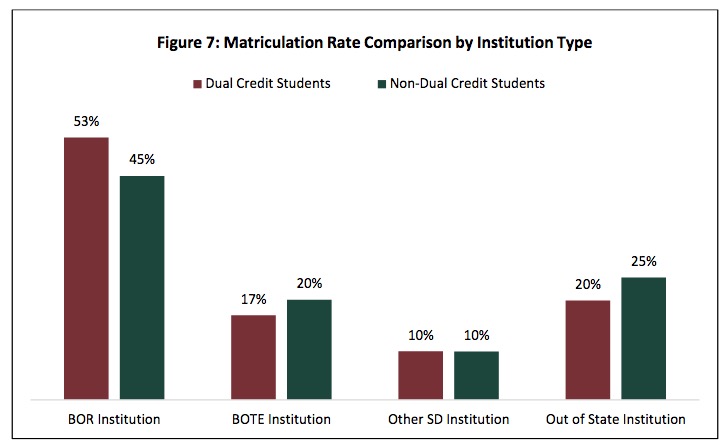
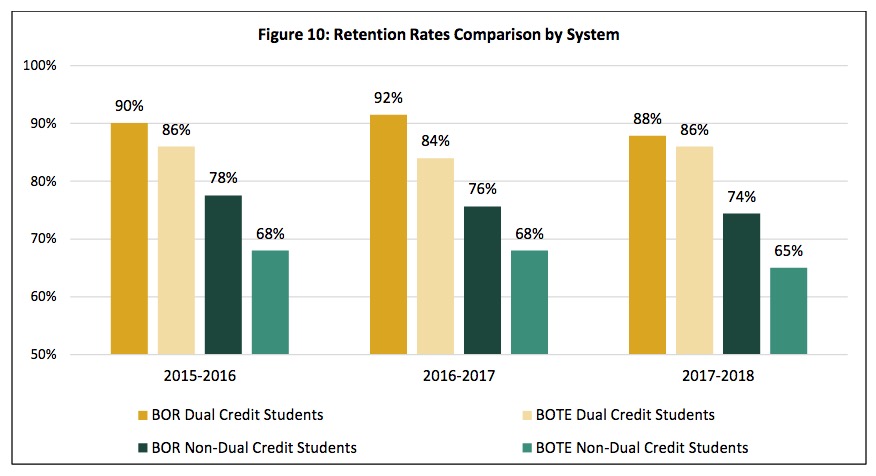
Interesting observations and analysis, but I want to offer one suggestion/correction. Rather than the term “vo-techs” I would substitute “technical colleges” which is the preferred language and their official designation effective 7/1/20.
I doubt any of those students were enrolled at Betsy DeVoid of All Humanity’s beloved Reagan U in Sioux Falls. She’s decided now is the time to investigate the empty building and search for someone to throw under the Dept. Of Uneducated bus.
is.gd/DGRifi